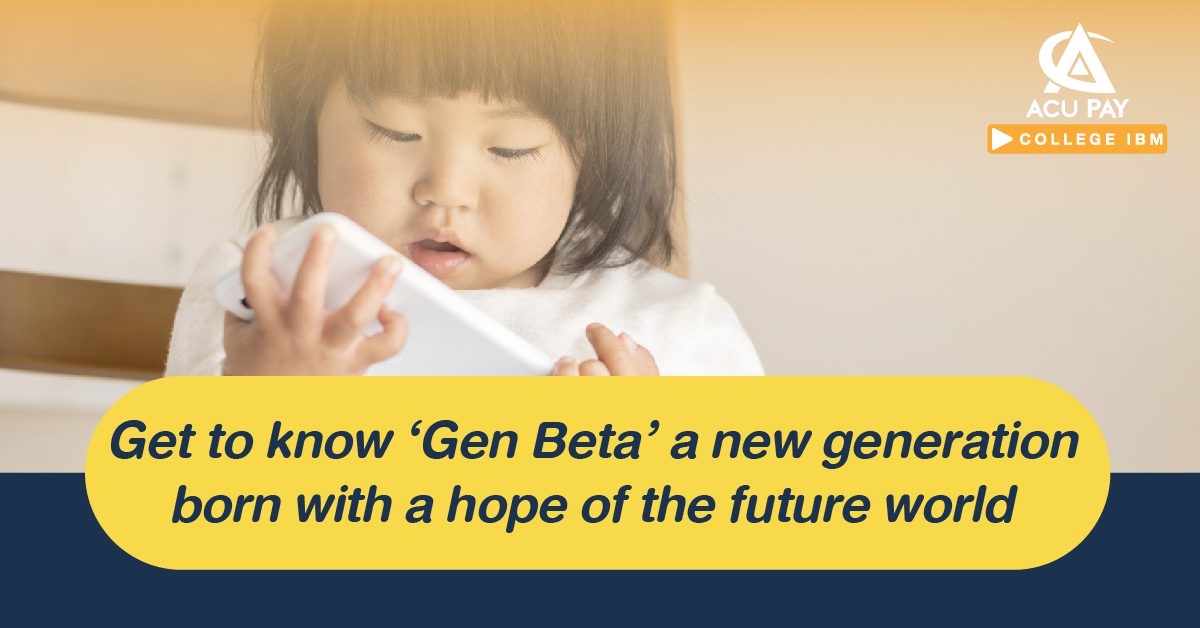

Generation Beta refers to babies born during the year 2025 – 2039. It was the first group to be born after the COVID-19 era and grew up in the midst of cutting-edge technologies such as AI, VR, and robotics, which were developed progressively by the previous generation.
Mark McCrindle, a social researcher and futurologist, predicts that Generation Beta children will become 16% of the world’s population. Another interesting thing is that babies born in 2025 are likely to be 76 years old in the next 10 years or within 2035 and may live to the 22nd century, which is something that today’s generation may not quite reach.
The Generation Beta is not only a simple-looking word in Greek alphabetical order following the “Generation Alpha” but also a symbol of a new era full of limitless possibilities.
However, Generation Beta children are born with all the challenges of social conditions, global population changes, and severe climate change. Gen Beta children are an eye-catching group to drive the future with the potential and understanding of complex global issues.
Generation Beta children will grow up in a world where AI and automation are fully integrated into their daily lives, from AI-based schools with individual customized teachers to health systems that diagnose and recommend treatments in real time. Their lives will be connected online and offline seamlessly. Learning, working, and living will be incorporated into digital systems that facilitate all aspects.
However, Generation Beta faces complex global challenges such as climate change, growing population, economic disparities, and social and cultural changes. They will be produced by parents in Generation Y and Z, who aim for their children’s skills to face challenges in the future.
A generation is a social generation that is determined by politics or social events. Divided by the year of birth according to demography. The generation of each GEN allows us to understand the differences in behavior, habits, and ways of looking at the world of people growing up in different environments according to the times.
Those who were born from 1928 to 1945 (ages 97 – 80 years old) believe in pragmatism, hard work, loyalty, patriotism, and keeping the rules.
Those who were born from 1946 to 1964 (ages 79 – 61 years old) are a large population that focuses on working hard for stability in life.
Those who were born from 1965 to 1980 (ages 60 – 45 years old) are the beginning of computers, self-reliant and self-believing, independent, and challenging.
Those who were born from 1978 to 1996 (ages 44 – 29 years old) grew up with the transformation of digital technology, committed to social justice, appreciated diversity, and liked to work as a team.
Those who were born from 1997 to 2009 (ages 28 – 16 years old) grew up with technology, multiculturalism, open-mindedness, self-confidence, and courage.
Those who were born from 2010 to 2024 (ages 15 – 1 year old) specialize in technology because they use technology that is agile at an early age and highly self-directed learning.
Those who were born from 2025 to 2039 (newly born) grow up in cutting-edge technologies such as AI and VR smartphones and are ready to face global challenges such as climate change, global population overflow, economic disparity, and social and cultural changes.
Raising Generation Beta children needs to be completely aligned with the world where technology is a part of life. Adults should balance technology use and develop life skills such as screen time constraints, digital extraterrestrial activities, and online safety instruction, as well as instilling ideas about sustainability and environmental awareness. Also encourage them to develop creative skills, problem-solving, and mental flexibility so that they can adapt and create new opportunities in an ever-changing world.
Adults should act as supporters, embrace change, and learn together with children to prepare for the future that the next generation, such as the “Generation Gamma,” will face in an increasingly complex world, but continue the legacy of creativity and environmental consideration from previous generations.

MAKE A GREAT DAY WITH ACU PAY